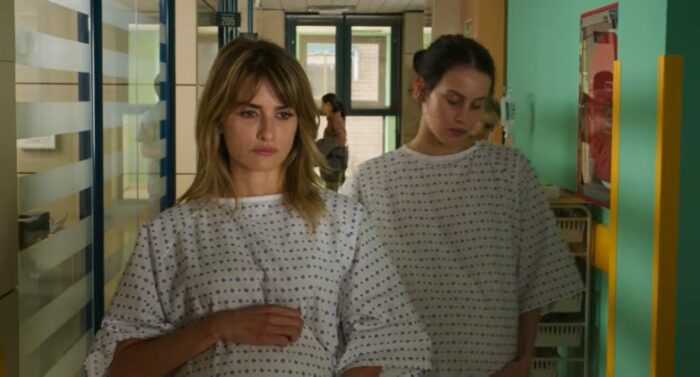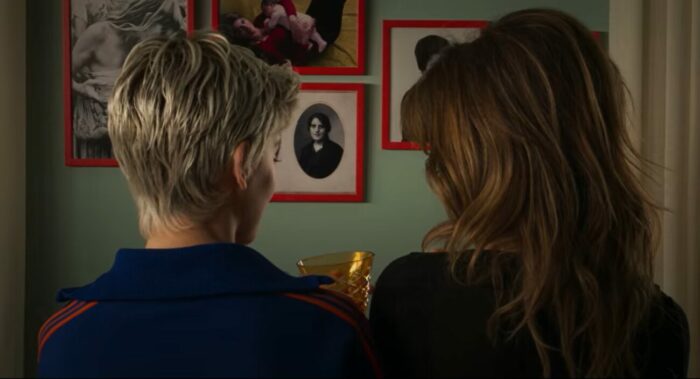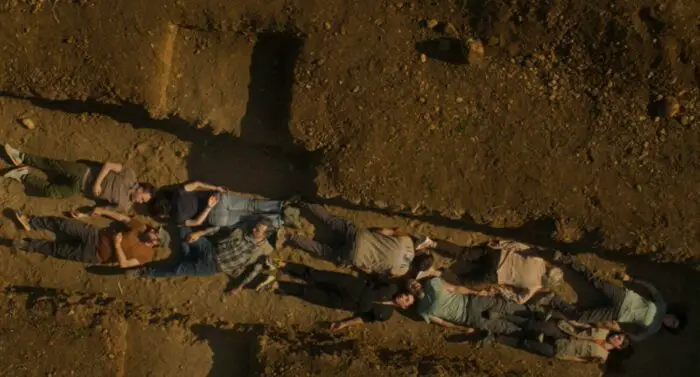How do the secrets of the past, or present, affect the lives of people? And what happens if these secrets are not personal but collective? To what extent can people or societies go on living a normal life if the wounds of the past are not healed? Parallel Mothers, the latest film by Spanish director Pedro Almodóvar (released in 2021), offers its view on these issues through the story of the main character—Janis.
On a superficial level, Parallel Mothers tells the personal story of two mothers: Janis (Penélope Cruz), 40 years old photographer, and Ana (Milena Smit), a teenage girl. Two pregnant women meet in a maternity ward and deliver their baby girls on the same day. As a result of this meeting, their lives become intermingled in a curious way.

The story of two mothers is structurally framed by the theme of historical memory of Spanish society. The film starts and ends with it. At the photo shoot, Janis meets Arturo (Israel Elejalde)—the anthropologist who works on historical memory projects. She asks him for help with implementing an excavation of a mass grave in her village where ten victims of the Spanish Civil War, including Janis’ great-grandfather, are buried.
With this historical context, the film also becomes the story of mothers, death and birth. But in this case, I would say it’s a country ‘pregnant’ with its memories and secrets which still have to be ‘delivered’. Perhaps, it’s not surprising that the bearers of this memory in the film are women—mothers and grandmothers who want to excavate the mass grave where their ancestors are buried, to be able to mourn them and pay respect.
Since the film circles around motherhood, it’s natural that, apart from Janis and Ana, there are many other mothers in this film. All of them are different in one way and similar in another. Some of them are alive, others already dead. These mothers represent different generations, carrying the burden of their own times. Grandmothers are burdened with the memories of the civil war and lost fathers. The younger generation, represented in this case by Ana, with its specific problems. Two mothers are from a generation between them—Janis and Ana’s mother, Teresa (Aitana Sánchez-Gijón). All these women have their struggles of ‘maladaptation to extrauterine life’—as Janis is told about her daughter soon after she’s born.
Janis and Teresa, with all their differences, have a trait that is, in my opinion, characteristic of their generation—importance of career success. They were raised in radically different families. Janis, named after Janis Joplin by her hippie mother was raised in a liberated atmosphere. She is in control of her life and decides to have a child when she is already successful in her profession. Teresa, who was apparently raised in a conservative family, has done everything in the opposite order.
But the central pair of these mothers are, of course, Janis and Ana. They are both single mothers. For Janis, having a child was a conscious decision. Being a single mother is apparently not an unusual thing in her family—her mother and grandmother were single mothers too. She never knew her father.

Ana’s story is different. She is too young to be a mother, and neither did she choose to be a mother. Ana was sent to Madrid by her conservative father (so we can assume, as he’s only mentioned in the film) who was concerned more about what would people say than about his daughter’s well-being. So Ana moved to Madrid to live with her mother, an actress who is focused on her career success.
Characters in Almodóvar ‘s films are never perfect. But those less sympathetic are usually given the opportunity to show a different side of themselves and the reason behind their controversial behavior. This is the case with Teresa too. When she tells her life story to Janis, it is hard not to sympathize with her desire to be free of oppression from society and her family, in the way she could, and to become an actress as she always dreamt. Her attitude negatively affects her daughter though, who turns to Janis to seek the care she needs.
As I’ve mentioned, there are many parallel stories in the film. Janis is at the crossing point of those different generations and attitudes. The story of her great-grandfather and the mass grave becomes the connecting link between the dark pages of history and a new generation who seem to be unaffected by it.
But the theme of secrets enters Janis and Ana’s personal lives as well. When Janis finds out that babies have been changed at the maternity ward, she decides to keep it secret. Why? Hard to say. Perhaps because she is already attached to her baby and doesn’t want to let her go. Is she overprotective? I guess she is. Was she like that even during pregnancy, so that it caused her daughter difficulties breathing outside the womb? I’m stretching, I know. Things like this can’t be scientifically proven. But if look at it on a symbolic level—why not? The baby, in fact, dies later by sudden infant death. Her brain forgot to give a command for breathing—says Ana when she tells Janis about it.
I’ve mentioned the unaffected younger generation above. But is it really unaffected? Is it possible to forget about unanswered questions of the past, when there are still thousands of missing bodies and even more family members of victims of war crimes who want to find places of their ancestors’ burial? Ana is seemingly one of those unaffected by the past. At one point, she repeats the words of her father, saying that it’s better to forget the past and look toward the future. And, to be honest, isn’t it right to look toward the future? Because nothing good results from being attached to the past. But this kind of attachment cannot be overcome just by forgetting the problem.
The final shot of the film suggests that no one is unaffected. Those buried secrets and unanswered questions are hanging in the air. Women from Janis’ village did the best they could—they did not forget. Those memories must be unearthed and secrets revealed. Janis gets a second opportunity for motherhood only after she tells the truth, no matter how painful it is. This is true on a collective level as well.

Uncovering secrets can be at times as painful as the process of delivery of the child. But it is unavoidable. Otherwise, the descendants can stay forever tethered to the graves of missing victims, tied to death and destruction, rather than life and the future. And as a result, those secrets will demand more victims like Janis’ daughter, or even girls like Ana.
Parallel Mothers is a Spanish film dealing with problems of Spanish society and its historical memory. But all countries and societies have their own unattended wounds. Covering up old wounds and pretending that they do not exist can cause more and more trouble and traumas. With time, we may not even be able to understand what’s the problem. That’s why remembering is important. Because sooner or later, the past wounds have to be treated. This is the only way we can be liberated from them. And only then we are able to really look forward.


